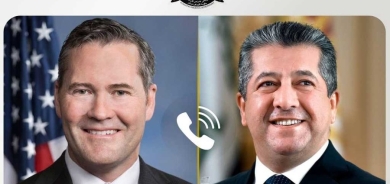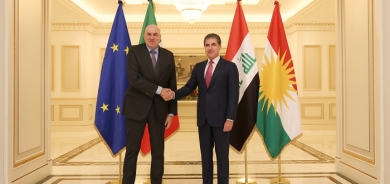Michael Knight to Gulan: The Federal Government is fighting back against the distribution of power to the regions and to the provinces
December 7, 2011
Exclusive Interviews

Michael Knight is senior researcher in Washington Institute for Near East Policy and specialist on military affairs and security in Iraq, Iran, Yemen, and the Arab Gulf Countries.The Professor Knight visited Iraq and the Gulf countries continuously as being a Pentagon Consultant, and he was one of the team members since 1990 that collected information about Iraq, and he also studied the lessons the United States conducted in both military processes against Iraq in 1990 and up to the day. The Professor Knight is currently at Washington Institute for Near East Policy and is one of the prominent researchers on Iraq. Regarding to the current situations of Iraq and the withdrawal of the US Forces, we have contacted the Professor Knight and addressed few questions about the topic described above, and he replied to our questions in an exclusive interview to Gulan Magazine as the following:* The main problem of the Arabic and Islamic countries is the presence of dictatorship and oppressive authorities. These regimes have violated human rights and oppressed the minorities and other ethnic groups in their country. So, we would like to ask you; why still these dictatorship regimes are in power?
- Well, I want to start by Iraq, I think what we were seeing with Libya, Syria and Iran is that oppressive regimes are a lot more difficult to get rid of than what might appear. So you look at Tunisia and Egypt doesn’t pretty fast but the other places are held on for a lot longer. So some of these regimes and Saddam Hussein’s regime would have been similar are very difficult ….., remember 1991 we saw that in Iraq it shows that these regimes got a lot of rebellions, and in terms with the amount of the physical power like in bring to the streets they are military powers, considerable.
* Iraq, unlike the Arabic and Islamic countries, was supposed to step toward democracy after the toppling of Saddam Hussein’s regime, but as we notice; the Iraqi government is becoming totalitarian and violates the fundamentals of democracy. So, in your view; if Iraqi government back off the democracy development process, what happens to the future of Iraq?
- Well Iraq has a great deal of promise, a great deal of potential, and the oil and gas are important, but the most important thing about Iraq is that it can be the first multi-cultural, multi-ethnic federal democracy in the Middle East, it can be a real deal. And that is why it is so important for us to continue gradually and persistently pushing the democracy agenda in Iraq. The West should never give up on the democratization in Iraq, because a democratic Iraq is more important than any the other countries put together really, I truly believe that, you can get a democratic Iraq in hopefully one day a democratic Iran, the region would be stable for long term potentially. So what we see in the moment in Iraq is that the government is still acts early stage of development, it might take a couple more cycles of elections, and a new generations of leaders coming to position, probably before healthy democracy can grow in Iraq, and I’m sad about that, it would have been nice if the 2010 elections could have both together a nationalist government the head of real manifesto, but unfortunately we’re still at the early stage, the political parties are not mature enough, the political system, the federal court and the legal framework for political parties is still too immature for us to have a very healthy democracy in Iraq, but on the other hand it must have us cost and it was under Saddam in terms of governance we had at least a possibility of a democratic government in the future, where that possibility never existed at all under Saddam. It was inevitable that after the dictatorship we would have this period of weak democracy and there would always be a threat of new dictatorship, but I think the Iraqi political system and the constitution in which you adopted in 2005 at least keeps democracy alive for long enough that the political system become mature.
* Some experts mention the importance of changing and re-writing the constitution of the Arabic countries on one hand, on the other hand we see that Iraq owns a new constitution and it’s been violated by the Iraqi government, which is quiet a pessimistic point. So, what is the importance of new but non-functional constitutions?
- I think no constitution is perfect as soon as it might, if you look at US constitution it has been amended many times, if you think about first US constitution there was still slavery, some thinking that today it would be unthinkable. So if you look at the first US constitution as basic standard it would be a very bad constitution, so they had to change it multiple times. Now I think in Iraq the process will be faster but there is probably a lot of work to do on the constitution, I mean maybe not on changing the constitution, but on creating Iraq moves to implement the constitution, that is where the problem is. The constitution is so big that the colonies are implementing the constitution, the constitution for me it sees basically okay, it is that we never created implementing legislation that was occurred to really make the constitution to make sense. And that is really something that is going to slowly be done over the next decade at least. And it can only be done right if the political parties are mature and modern and free of corruption. And that is going to take a while.
* Many political experts on Iraq think that; if Iraqi government fails to resolve the Sunni-Shiite conflict and the suspended problems with the Kurds, Iraq will not stay unified. But, we see that Iraqi government hasn’t been able to resolve the Sunni – Shiite conflict and the suspended problems of the Kurds regarding the disputed area, so how far this threatens the unity of Iraq?
- I think they threaten the safety and security of people who live in the disputed territories, I think they threaten the functioning of Iraqi parliament and I think they complicate economic development, investments and relations with foreign states. But I don’t think that the problem between KRG and the federal government threatens overall the stability of Iraq or the future unity of Iraq. I’ve spent a lot of time being in KRG and I’ve spoken to a lot of key leaders, and one thing that I still believe is that the Kurds see their future as part of Iraq, maybe if their relationships with Turkey change completely for the better that would be a different case. But as we see for the recent events that there is no guarantee that KRG’s neighbors will remain friendly with KRG, even with Turkey’s new policy there is still room for misunderstandings and break downs of the communications, and for the all bad history to come up again. I think if you look at the Iraqi leaders, I think the oil says it all, now the KRG have got a lot of oil, but I think at the moment the benefit of it is still being part of Iraq. Iraq is making 6 million barrels of oil per day, or more, for the KRG to get 17% of 6million barrels per day is better than getting money from the only oil in Kurdistan, and they are going to get more money from the oil in Kurdistan as well. So, I just think of the basic maps, the basic economics point to the fact that KRG will stay in Iraq and then these problems on the disputed borders will be painful and destructive but it doesn’t threatening the overall stability of the country.
* Part of the problems in Iraq is regarding the sharing of natural resources’ revenue among the components of Iraq, Iraqi constitution has mentioned the way of sharing the revenues, but the Iraqi government has prepared the oil and gas laws which doesn’t match the Iraqi constitution and wants to approve these laws. So, in your opinion; how far creating obstacles for sharing the oil revenue questions the sovereignty of Iraq as a federal state?
- Yes, I think there is a lot of issues to deal with as article number 111, 110 and 112 all of these kind of articles are the ones that deals with distribution and goes to the federal authorities and the authorities of the regions and provinces, and there are a lot of questions to answer about that. But, these are questions that are most large nations have to deal with, they are unfamiliar problems in the Middle east, because most of the states have functioned as highly centralized states, there are few examples in Middle East of strong federal democracies where the considerable amount of power and indeed fiscal independence is devolved to the regions and provinces and districts and sub-districts within the country, so this is an experiment, and it is complicate by history between the Kurds and the Arabs in Iraq, and between the Kurds in only neighboring countries. So it would be complicated problem even if there are no special issues related to the Kurds, but the special problems related to the Kurds may be is even more complicated, it probably going to take decades to deal with. Everyone is looking at the oil-gas laws and they say this is a problem we need to deal with today, next month or next year, realistically that is not going to happen. You know, now we’ve been waiting since 2003 to get a real oil and gas law in place, and it is 2011 we’re probably not that close to get oil and gas law in place, we could be having same conversation in 5 years’ time.
* According to Iraqi constitution Iraq must be a federal state, but it has been 8 years since the toppling of the former regime, but Iraq is still a central country. So, how far keeping centralism in Iraq threatens the change of Iraq into dictatorship again?
- Well you know, you hit the nail on the head, that’s we saying in Britain, you get to the point, which is that: the federal government is fighting back against this distribution of power to the regions and to the provinces, you know the federalism in Iraq was an American Idea and also was a Kurdish idea and this now we see the federal government and many of the Arab political parties are fighting back against that, so it is going to be a back and forth fight that is for sure, and of US leverage and influences in Iraq reduces, I think federalism loses one of its big supports. Now the KRG I think is safe, I think the KRG will always be a federal region and it will always have a lot of powers, and it will do a lot of things inside the KRG regardless what Baghdad says, regardless what anyone say. You now they are in control of themselves, and I think they have a lot of autonomy in that way, semi-autonomy. But in other parts of Iraq, yes there definitely will be a struggle as the US is leaving between provinces and the federal government and between the districts and the provinces for sure. How will that come out? My got instances is that I think Iraqi politicians in Baghdad, like Maliki; will often have to give the provinces more money, independence, when they want to win the political favor, when they want to win over the people in the provinces. So, I think in every election time there might be promises and they give something to the provinces, you know they give petro-dollars to individual provinces, and then as we get between the elections that money will start to dry up and the federal government will try to clone more power and as it gets close to the national relations then will prevent the elections, and you know the provinces will get more oil, more freedom, more money and more independence. So it think it is going to be constant back and forth, like when you see the waves on the sea, the tried comes in and the tries comes out. It is going to be long term struggle for power in Iraq and that will probably never stop really.
* Last Question: in case any struggle, conflict or civil war take place between the main Iraqi components or if there is going to be any external intervening especially by the Iraqi neighboring states, do you think USA will be interfering in a way or another to support the Iraqi government?
- I don’t think there is a chance of civil war, I think there is a very low chance of civil war in Iraq now, I think what we had in 2006 and 2008 was close to civil war, and I think when the country is gone through that and survived then it is not in a mood to do it again, very quickly. So, I think there is no chance. The neighbors are middling in some ways, but I think their influence is overestimated, I think that is an attractive idea that problems come from outside, it is an attractive idea that the Americans cause some problems, the Iranian, the Saudis, and the Turks, that is true that these countries do interfere in to Iraq’s politics, the Americans and Iranians interfere a lot, the others interfere some to some extend, but realistically the power is in the hand of Iraqis, if Iraq is going to work it is because Iraqis made the right decision. If Iraq is going to fail, it is because Iraqis made the wrong decision. The sooner Iraqis accept that, the soon Iraqis think that they take full responsibility for the country.
* Your last word and message to the Iraqi people?
- To keep the faith in democracy and I wish them all very peacefully as a head, and God bless Iraq.
Transcription: Sheban Ferhad















